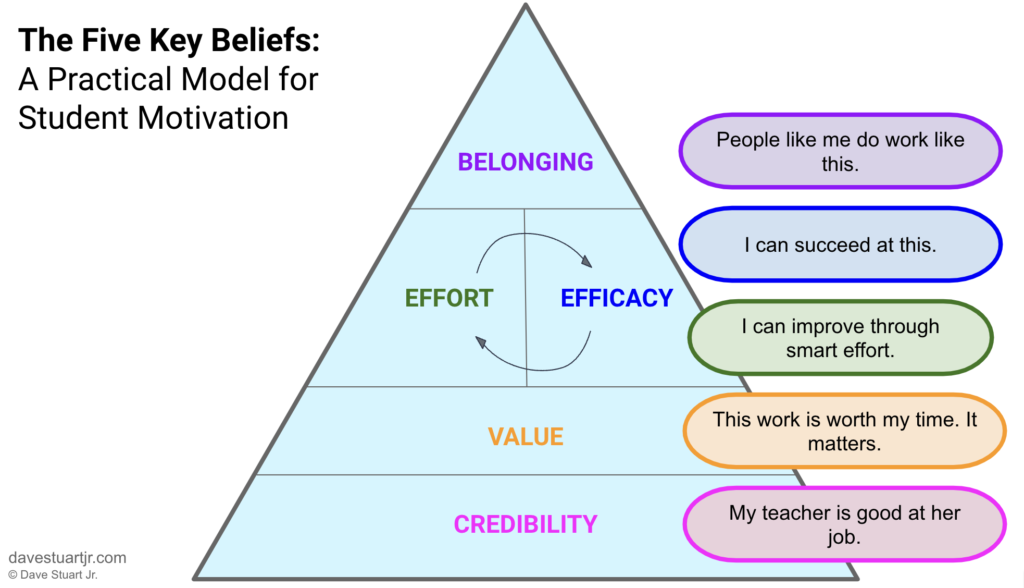The goal of good PDs is the development of 1) shared understandings that 2) make a difference.
Quick breakdown:
- Shared understandings trump shared emotions. Sometimes you sit in a PD that seems just aimed at a feeling, but the trouble is that my thoughts last longer than my feelings. I'm all for getting some proper feels going during the learning process — we're emotional creatures, and learning is whole-soul work that ought to include the emotions sometimes — but, from a strategic standpoint, if a PD session doesn't build shared understanding, it doesn't do much long-term.
- In other words, it doesn't make a difference.
- What kind of difference?
- Teachers have greater problem-solving power with which to meet the challenges of this work.
- Teachers have greater inner strength with which to come to the work in the first place.
- Students slowly see the downstream effects in all their classrooms as teachers begin approaching the work from a deeper, simpler, more robust understanding of something essential to what schools are for.
This is why my new edu-leader course is focused on the five key beliefs (5KB) methodology. I don't know of any other framework that's got as much potential for whole-school impact as the 5KBs.
So, here's today's question: what's a minimum viable understanding of the five key beliefs — meaning, what should we aim at first when leading professional development movements around the 5KBs? Or, if you're reading this for your personal practice, what's a minimum viable understanding for you to pursue building in yourself about this methodology?
Well, that's a great question that I've been thinking a lot about this year. Here are the bullet points:
- Schools are for advancing the long-term flourishing of all young people, specifically by helping them to master the disciplines and the arts. This mastery is our unique and collective “lane” in the life of a student. And within a school, each role player (teachers, counselors, parapros, admin, TOSAs) contributes to the degree to which we make good on our lane.
- The hardest thing about our mission — and the most beautiful thing, I think — is that mastery isn't something you can force upon somebody. You can't coerce a person into getting better at mathematics or gaining expertise at an instrument. This is because mastery comes when a person does (the right) work and does it with care. It's the care part that we chronically miss in schools. There are lots of ways to coerce students into doing work, but human beings just can't be coerced into caring.
- But we NEED students to care. So what are we to do? This is where the five key beliefs come in.
(It's worth pausing here to see that our first few steps of the minimum viable understanding are for contextualizing this methodology — it's not “one more thing” this way, and instead is positioned as a tool that helps us to do our ONE THING.)
- So, what are these beliefs? The beliefs are summed up in the diagram below. When they're present in a student's heart, you'll see the student doing work with care; when they're not, you won't. This isn't something to be mad about; it's just an observation of the reality.

- Teachers tend to underestimate the degree to which these beliefs are influenceable, particularly when students are with us in the classroom. Yet, the research is clear that they are remarkably influenceable. IMHO, this is the most powerful untapped asset in every classroom in the world — this unfortunate blindness to the degree to which these beliefs can be cultivated in a classroom and the degree to which teachers have power in doing this cultivation.
From this point, you've got a nice minimum viable understanding (MVU) of the five key beliefs, but you've got nothing practical to do with it. That's why the next task is exploring how the credibility, value, and effort beliefs work, and the most graspable methods for influencing each (tracking MGCs, sending relentless value signals, and John Woodenizing effective effort).
By this point, you've got a heckuva groundwork for understanding and doing something about the five key beliefs in your setting.
Best,
DSJR
P.S. Want to discuss me heading your way to do some Five Key Beliefs PD in the coming months or year? If you're a PD decision-maker or have the ear of one, be in touch here.
Leave a Reply